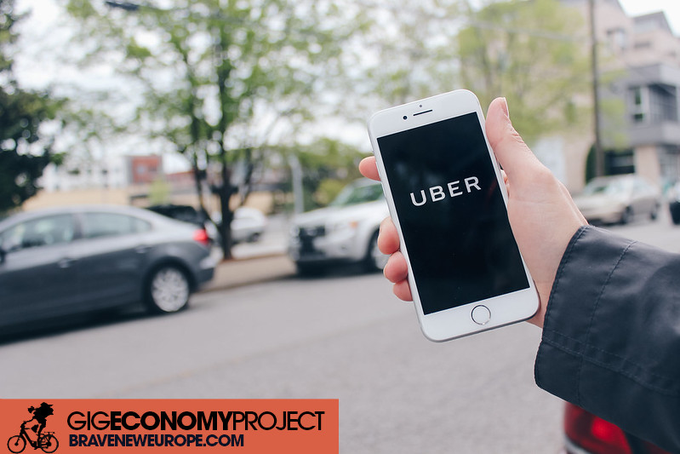A court in Amsterdam has ordered Uber, the ride-hail platform, to re-instate six drivers and pay compensation, on the basis that they were wrongly fired because the decision was made automatically by the company’s algorithm.
The Gig Economy Project, led by Ben Wray, was initiated by BRAVE NEW EUROPE enabling us to provide analysis, updates, ideas, and reports from all across Europe on the Gig Economy.
This series of articles concerning the Gig Economy in the EU was made possible thanks to the generous support of the Foundation Menschenwürde und Arbeitswelt


The landmark verdict, published on Wednesday [14 April], was the first to be based on Uber being in breach of EU General Data Protection Regulation (GDPR) Article 22(1), which states that “the data subject will have the right not to be subject to a decision based solely on automated processing, including profiling, which produces legal effects concerning him or her or similarly significantly affects him or her.”
The case, which was brought forward by Worker Info Exchange and the App Drivers & Couriers union (ADCU) in the UK, could have repercussions across the gig economy, where the unfair ‘robo-firing’ of workers – who can be deactivated from use of the app without any recourse to appeal – has been an issue raised by unions and gig workers as one of increasing concern.
Uber’s European operations are headquartered in the Netherlands, but the company did not appear before the court to defend itself, losing the case by default.
The court ordered “the defendant to reverse the deactivation of the claimants’ Uber Driver accounts within one week of service of this judgment”, with a €5,000 fine for every day the decision was not reversed. Compensation totalling over €100,000 was also to be paid to the six drivers.
The verdict was delivered on 24 February but was only made public by the court today [14 April]. ADCU say the Uber drivers have yet to be re-hired or have compensation paid.
James Farrar, Director of Worker Info Exchange, said: “For the Uber drivers robbed of their jobs and livelihoods this has been a dystopian nightmare come true. They were publicly accused of ‘fraudulent activity’ on the back of poorly governed use of bad technology.
“This case is a wake-up call for lawmakers about the abuse of surveillance technology now proliferating in the gig economy. In the aftermath of the recent UK Supreme Court ruling on worker rights, gig economy platforms are hiding management control in algorithms. This is misclassification 2.0.”
An Uber spokesperson told the Guardian: “Uber only became aware of this default judgment last week, due to representatives for the ADCU not following proper legal procedure. With no knowledge of the case, the court handed down a default judgment in our absence, which was automatic and not considered.”
Earlier this week in a separate case, the City of London Magistrates Court ordered Transport for London (TfL) to reinstate the license of one of the drivers, Abdifatah Abdalla, which was revoked after Uber notified TfL of his de-activation.
Abdalla received a message from Uber saying he was being de-activated because of “security concerns related to account sharing”. No evidence was ever provided, and Abdalla denies ever sharing his details.
TfL told the court that Uber had said Abdalla’s account was de-activated because two devices had attempted to log-in within minutes of each other from a significant distance apart.
Commenting, Yaseen Aslam, President of the ADCU, said: “I am deeply concerned about the complicit role Transport for London has played in this catastrophe. They have encouraged Uber to introduce surveillance technology as a price for keeping their operator’s license and the result has been devastating for a TfL licensed workforce that is 94 per cent BAME.
“The Mayor of London must step in and guarantee the rights and freedoms of Uber drivers licensed under his administration.”
The court decisions come as scrutiny grows on the algorithmic power of digital platforms over gig workers.
In January, a court in Bologna found that a Deliveroo algorithm was “discriminatory” because it punished riders who took strike action or were ill.
In March, in another court case brought forward by ADCU in Amsterdam, a Judge found that Uber and Ola Cabs need to reveal the processes behind their use of personal data in the surveillance of drivers.
Farrar has recently described the growth in platform surveillance systems of gig workers as an “arms race”.


Be the first to comment